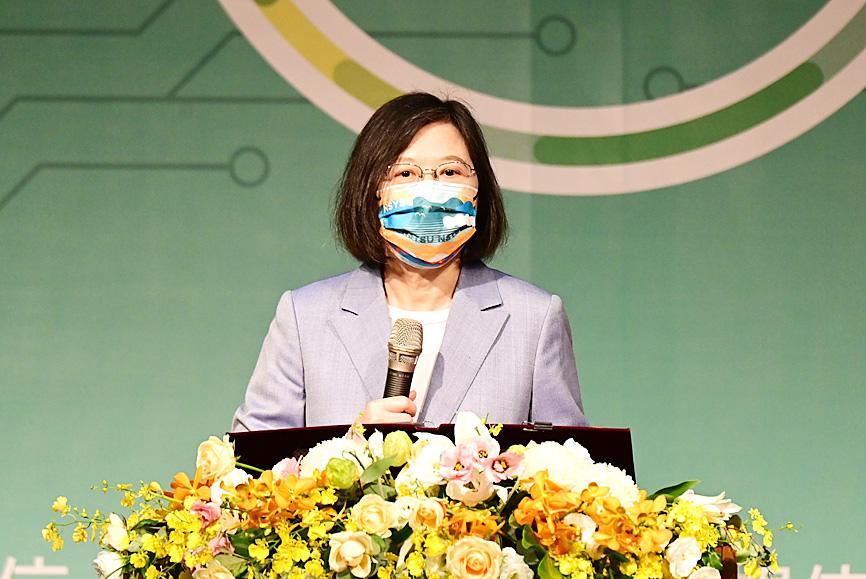National Sun Yat-sen University (NSYSU) and seven local companies in Kaohsiung yesterday inaugurated the institution’s College of Semiconductor and Advanced Technology Research, the latest local university to set up a semiconductor talent cultivator.
The new semicondcutor college would enable the government, academia and industry to cooperate on cultivating talent, President Tsai Ing-wen (蔡英文) told the ceremony.
The semiconductor industry is vital in Taiwan, generating output of more than NT$4 trillion (US$133.71 billion) last year, Tsai said, adding that international demand for Taiwanese semiconductors is growing.

Photo: Lee Huei-chou, Taipei Times
NSYSU plays an important role in cultivating talent in the industry, with the seven companies investing about NT$900 million to foster chip testing and packaging, and electronic components talent over the next 10 years, she said.
Tsai thanked Kaohsiung Mayor Chen Chi-mai (陳其邁) and his municipal administration for cooperating with the central government on the expansion at NSYSU, which in March opened its School of International Finance.
“I am grateful to President Tsai for setting a clear direction for the country’s development, because where the president’s policies are, there are resources,” Chen said.
Also at the ceremony were Democractic Progressive Party Legislator Lai Jui-lung (賴瑞隆), NSYSU president Cheng Ying-yao (鄭英耀), Deputy Minister of Education Lio Mon-chi (劉孟奇), National Development Council Deputy Minister Yu Chien-hwa (游建華) and 300 tech-sector representatives.
“I am grateful to NSYSU president Cheng and all of the university’s staff for their dedication and support of industry,” Tsai said. “Through that dedication and cooperation with the government, NSYSU has inaugurated two new colleges in a short time.”
Huang I-yu (黃義佑), who was NSYSU’s vice president, stepped down to serve as the semiconductor college’s first dean.
Tsai thanked Huang for making the transition, saying it would contribute to the success of the college.
“Tsai’s continued support has allowed higher education in Taiwan to effectively cooperate with industry,” Cheng said. “This has allowed us to keep talent in Kaohsiung, to make our students more competitive and to deploy our skills globally.”

South Korea’s equity benchmark yesterday crossed a new milestone just a month after surpassing the once-unthinkable 5,000 mark as surging global memory demand powers the country’s biggest chipmakers. The KOSPI advanced as much as 2.6 percent to a record 6,123, with Samsung Electronics Co and SK Hynix Inc each gaining more than 2 percent. With the benchmark now up 45 percent this year, South Korea’s stock market capitalization has also moved past France’s, following last month’s overtaking of Germany’s. Long overlooked by foreign funds, despite being undervalued, South Korean stocks have now emerged as clear winners in the global market. The so-called “artificial intelligence

NEW IDENTITY: Known for its software, India has expanded into hardware, with its semiconductor industry growing from US$38bn in 2023 to US$45bn to US$50bn India on Saturday inaugurated its first semiconductor assembly and test facility, a milestone in the government’s push to reduce dependence on foreign chipmakers and stake a claim in a sector dominated by China. Indian Prime Minister Narendra Modi opened US firm Micron Technology Inc’s semiconductor assembly, test and packaging unit in his home state of Gujarat, hailing the “dawn of a new era” for India’s technology ambitions. “When young Indians look back in the future, they will see this decade as the turning point in our tech future,” Modi told the event, which was broadcast on his YouTube channel. The plant would convert

‘SEISMIC SHIFT’: The researcher forecast there would be about 1.1 billion mobile shipments this year, down from 1.26 billion the prior year and erasing years of gains The global smartphone market is expected to contract 12.9 percent this year due to the unprecedented memorychip shortage, marking “a crisis like no other,” researcher International Data Corp (IDC) said. The new forecast, a dramatic revision down from earlier estimates, gives the latest accounting of the ongoing memory crunch that is affecting every corner of the electronics industry. The demand for advanced memory to power artificial intelligence (AI) tasks has drained global supply until well into next year and jeopardizes the business model of many smartphone makers. IDC forecast about 1.1 billion mobile shipments this year, down from 1.26 billion the prior

People stand in a Pokemon store in Tokyo on Thursday. One of the world highest-grossing franchises is celebrated its 30th anniversary yesterday.